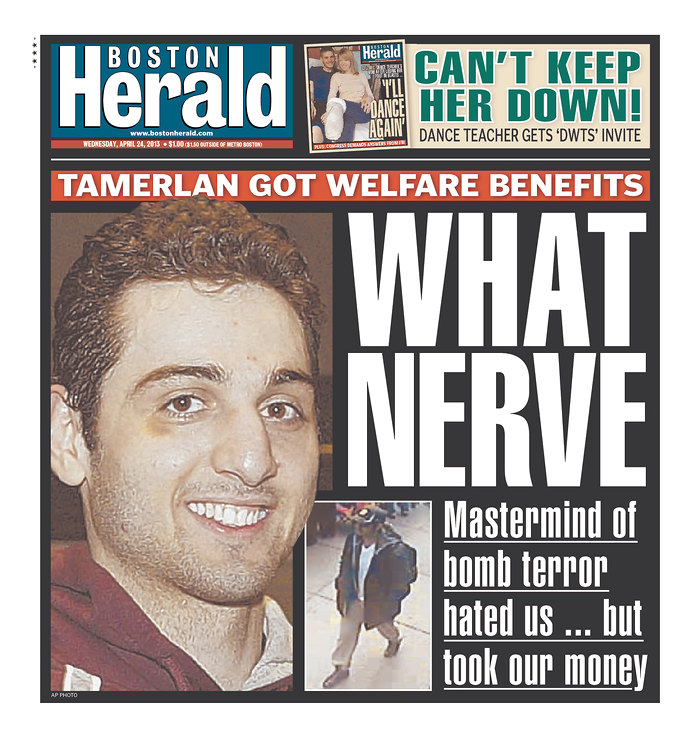The Tsarnaevs, Welfare, and the Boston Herald
The Boston Herald knew it had something good on its hands when it learned that Tamerlan Tsarnaev received welfare benefits until 2012. The paper just isn’t sure exactly what that something was. Here are the facts as the paper reported them:
State officials confirmed last night that Tsarnaev, slain in a raging gun battle with police last Friday, was receiving benefits along with his wife, Katherine Russell Tsarnaev, and their 3-year-old daughter. The state’s Executive Office of Health and Human Services said those benefits ended in 2012 when the couple stopped meeting income eligibility limits. Russell Tsarnaev’s attorney has claimed Katherine – who had converted to Islam – was working up to 80 hours a week as a home health aide while Tsarnaev stayed at home.
It’s a good scoop, in that it undoubtedly provides a fuller picture of the financial situation Tsarnaev, his wife, and his child faced in recent years. Of course, the Herald’s not reporting that the Tsarnaev’s didn’t qualify for the benefits. So what it says about our state’s welfare policies and how this revelation ought to color our impressions of them is … a bit less clear. But the Herald is willing to take some guesses. Let’s take a look at some of the feisty tabloid’s theories:
“The news raises questions over whether Tsarnaev financed his radicalization on taxpayer money.” As Esquire’s Charlie Pierce asks, “How exactly would ‘taxpayer money’ have financed his ‘radicalization”? By helping him pay his electric bill and his cable company so he could stay on line and watch crazy YouTube videos?” But hey, you know, maybe taxpayer money helped him purchase persuasive material that drove him toward terrorism. How should taxpayers address the loophole that allowed this? Should the state invest in a Delorian, do some time travel, then come back and implement a rule that excludes all future terrorists from receiving benefits? Sure, let’s all agree that this would be awesome, and it’d probably prevent some terrorist attacks. Until it’s possible, should we just eliminate our welfare program, given we have no way to screen for whether its beneficiaries will someday become criminals? We suspect we know the Boston Herald’s answer to that question …
Of course, the Herald article notes that the FBI received warnings about Tsarnaev in the years he received benefits. Maybe we didn’t need a time-travel machine. Shouldn’t we have stopped giving him money at that point, you’re left to wonder. Only if we expect welfare administrators to exclude people on the mere suspicion that they’re bad guys, which doesn’t seem like a great legal standard.
The bombings are “the grim
results of [Gov. Patrick’s] beloved immigration and welfare policies.” That one comes from Waldorf the Muppet Howie Carr, whose follow-up column stomps, confused and Bowser-like, around the issues but never quite makes his complaint clear. If he means to say that terrorism follows naturally from Massachusetts welfare policies, he seems to think it’s a self-evident point because he fails to argue for how or why.
“What nerve!” The third point, expressed in their cover headline, is simpler, one we can all get behind. “Mastermind of bomb terror hated us … but took our money.” Yes, it does require some nerve to take taxpayers’ money before murdering and maiming a lot of taxpayers. Though … dare we say this point is a bit obvious? On the scale of nervy things done by the Tsarnaev brothers, taking taxpayer money before bombing a crowd of people ranks somewhat lower than, uh, bombing that crowd of people in the first place. We already had some sense that these were nervy guys, and they did a lot of enragingly nervy things. Acting thankless for the benefits our government gave them is surely one of them. But we suspect the Herald’s unstated purpose here wasn’t to make readers more angry at the Tsarnaevs, but rather, to fit the words “tax-payer funded,” “welfare” and “terrorist” into the same sentences as often as possible, no matter how directionless were the words that came between them.



